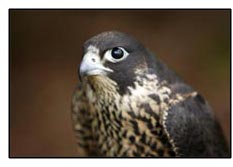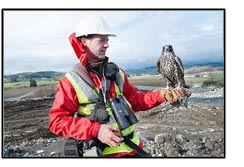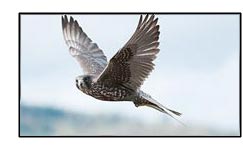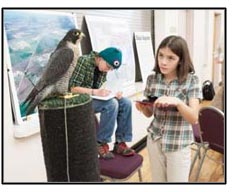
By Natalie Hardy November 30, 2012  Riverbend Landfill has a new weapon to combat seagulls and other winged pests. It weighs 620 grams and its name is Judah. Riverbend Landfill has a new weapon to combat seagulls and other winged pests. It weighs 620 grams and its name is Judah.Judah is a peregrine falcon. It belongs to a squad of four that began patrolling the landfill Nov. 8 as part of a new pest-management program. Judah and his co-workers have become well-known around Yamhill County vineyards, where they have long performed similar duty. In that case, their mission is to keep away fruit-eating birds from grape-laden vines toward harvest time. But they are new to the landfill, which is deploying them six days a week to deter seagulls and starlings. Kort Clayton, biologist by education and training, is a falconer with Airstrike. He has been training and deploying falcons for 20 years, the last three as part of a commercial bird abatement program.  Clayton was all smiles when he introduced Judah and the program to the audience at a Riverbend town hall Tuesday night. Clayton was all smiles when he introduced Judah and the program to the audience at a Riverbend town hall Tuesday night."Falconry is a proven technique to manage bird problems," Clayton said. Four falcons patrolling the airspace overhead is all that it needed to persuade pest birds to forage elsewhere, he said. The goal is to deny them access to easy pickings. He said seagulls soon learn to forgo the 60-mile trek inland and find places to forage closer to home. They re-program themselves to avoid the new danger. Pest birds are simply following the path of least resistance when they head for the landfill, and soon develop a dependency, he said. Chronic exposure to predatory falcons, which fly high, dive fast and sport razor-sharp beaks and talons, serves to restore them to their natural forage pattens.  Clayton said the results are almost immediate, and he expects the changes to stick. Clayton said the results are almost immediate, and he expects the changes to stick."They're changing their behavior," Clayton said. When he started work at the landfill, he counted 500 seagulls and 4,000 starlings. His goal was to cut the population to less than 100 gulls and 300 starlings. "They're changing their behavior," Clayton said. When he started work at the landfill, he counted 500 seagulls and 4,000 starlings. His goal was to cut the population to less than 100 gulls and 300 starlings.  Already, he said, the landfill is down to 300 gulls and 1,000 starlings. Already, he said, the landfill is down to 300 gulls and 1,000 starlings.The landfill is required under terms of its Department of Environmental Quality permit to manage its bird population. But Jackie Lang, the company's communications director, said there's more involved. "It's part of how we do business at a landfill in Yamhill County," she said."Managing birds effectively is an important part of being a good neighbor. "This issue of bird management has come up with the neighbors, so we've been working on a plan. We expect that falconry will be one part of a broader plan that we'll develop with the U.S. Department of Agriculture." Lang said Waste Management Inc., Riverbend's parent company, is encouraged with the early results. "We like this option because it's a natural way of managing bird population," she said. "We don't know how intense or costly the long-term program will be, but we've made a strong investment to understand how falconry can be helpful at Riverbend. After this test program we will evaluate where we are and get recommendations on what it takes to continue to achieve that." Of the 10 community meetings hosted by Riverbend this year, this one, introducing Judah and the falconry program, had the highest attendance. More than 60 people registered. The company plans to continue hosting monthly meetings next year. "We initiated these meetings to hear from neighbors and answer questions," Lang said. "We want to educate the community about our environmental protection systems. "We have worked hard to have an open and honest dialogue with the neighbors and others in the community. I hope people can see that we've been genuine and open. We've certainly done a lot of listening." Print This Page |